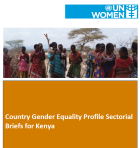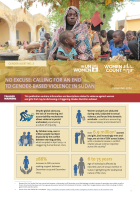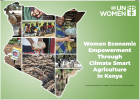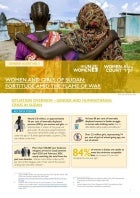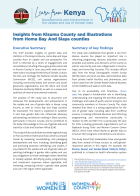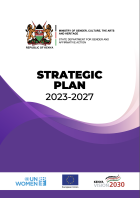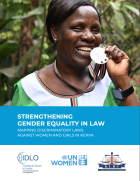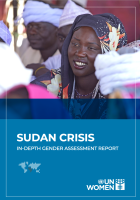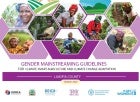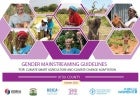1 - 20 of 73 Results
Pagination
Date:
These policy briefs, form part of the Country Gender Equality Profile (CGEP), evaluates gender equality in Kenya, offering evidence-based insights for stakeholders to advance commitments to Gender Equality and Women’s Empowerment (GEWE). Guided by the EU Gender Action Plan 2021–2025, they promote inclusive, transformative approaches to inform programmes, policies, and actions, addressing diverse gender needs and advancing Kenya’s Sustainable Development Goals (SDGs) through national and county-level collaboration.
Date:
Discover the key insights and milestones of the Beijing Declaration and Platform for Action (BPfA) as we approach its 30th anniversary in 2025. This publication explores progress made, persistent challenges, and Kenya’s contributions to gender equality. Highlighting actionable steps for individuals and organizations, it connects the BPfA to the Sustainable Development Goals, emphasizing its continued relevance in driving transformative change for women and girls globally.
Date:
More than 11 million people have been displaced amid the conflict in Sudan as of October 2024, with more than half (54 per cent) being women and girls. An estimated 12 million people are currently at risk of gender-based violence, as described in this new Gender Alert by UN Women.
Date:
The UN Women Kenya Annual Report highlights key achievements in advancing women’s empowerment and gender equality.
This report showcases progress in increasing women’s leadership and political participation, strengthening economic empowerment, eliminating violence against women and girls, engaging women in peace and security efforts, and enhancing planning and coordination.
UN Women Kenya remains dedicated to building a future where women are at the heart of developing resilient and sustainable communities.
Date:
The WEE-CSA Storybook showcases the success stories of over 2,400 women from Kitui, Laikipia, and West Pokot who have transformed their lives through climate-smart agriculture. Funded by KOICA and implemented by UN Women Kenya, it highlights the project's impact on livelihoods and gender equality while sharing valuable lessons learned. This collection celebrates resilience and aims to inspire further community upliftment for sustainable development in Kenya.
Date:
This publication provides a detailed analysis of the ongoing humanitarian crisis in Sudan, focusing on its disproportionate impact on women and girls. As the country faces the largest internal displacement since the Syrian civil war, millions of Sudanese, particularly women and children, are grappling with severe challenges.
Date:
Kenya has demonstrated thought leadership in the use of administrative and citizen data for statistical purposes and harnessing official data to meet national priorities and SDG targets including on gender equality and women’s empowerment. This product highlights tangible achievements and lessons in improving access to and use of this data to influence policy and decision-making and improve the lives of women and girls in Kenya.
Date:
The ultimate goal is that women and girls in Sudan benefit from gender-responsive humanitarian action and targeted assistance that responds to their basic needs, and from opportunities for their meaningful participation in peace, political and humanitarian processes.
Date:
The Publication is a detailed strategic plan for the period 2023-2-27. It highlights previous achievements, lessons and emerging issues that define the policy direction of the gender sector achieving a society free from gender discrimination and violence
Date:
Empowering women, building resilience: A UN Women and FAO Kenya project tackles climate challenges in arid regions. The initiative equips them with climate-smart agriculture skills, boosting incomes, nutrition, and their voice in agricultural policies. This collaborative effort fosters a future where women are key players in building sustainable livelihoods that thrive despite climate change.
Date:
UN Women and International Development Law Organization (IDLO), in partnership with the Kenya Law Reform Commission. Researcher/writer: Dr. Consolata Ngondi; Ms. Petronella Mukaindo
Date:
The objective of the present study is to present an overview of the adjusted gender pay gap and labour-market inequalities in Kenya. This is part of a larger 2023 UN Women study titled “Why Women Earn Less: Gender Pay Gap and Labour-Market Inequalities in East and Southern Africa.”
Date:
This brief emerges from the Country Gender Equality Profile (CGEP), which captures the country’s gender equality and women empowerment (GEWE) situation across Kenya’s diverse areas and contexts.
Date:
The assessment utilized the gender inequality framework used in humanitarian settings. The framework considered how the gender inequalities prevalent in pre-conflict contexts are exacerbated by conflict dynamics and how the impact differs with different gender roles. The framework indicates that the humanitarian responses should consider the basic livelihood needs and investigate and address some strategic issues that promote
Date:
The publication comprehensively analyzes the country’s gender equality and women empowerment (GEWE) situation across Kenya’s diverse areas and contexts.
Date:
The aim of the publication is to provide an understanding of the context of the eastern states, reflecting on the interplay between gender, conflict, and the environment. The findings of the study will support both AICS and UN Women in tack ling some of the differential impacts caused by conflict and environmental degradation on the lives of women.
Date:
The disproportionate burden of unpaid care and domestic work on women can significantly limit their ability to engage in productive activities or participate in public life and even contribute to the feminization of poverty. The new data is important for accurately measuring the household production of goods and services and their contribution to the national economy.
Date:
These guidelines seek to align the County Integrated Development Plans (CIDPs) with the Climate Smart Agriculture (CSA) and Climate Change Adaptation (CCA) policies, regulations and strategies for gender mainstreaming in Laikipia County. The guidelines were developed under the Economic Empowerment of Women through Climate Smart Agriculture Programme, supported by the Korean International Cooperation Agency (KOICA).
Date:
These guidelines seek to align the County Integrated Development Plans (CIDPs) with the Climate Smart Agriculture (CSA) and Climate Change Adaptation (CCA) policies, regulations and strategies for gender mainstreaming in Kitui Count. The guidelines were developed under the Economic Empowerment of Women through Climate Smart Agriculture Programme, supported by the Korean International Cooperation Agency (KOICA).
Date:
This Initial Rapid Gender Assessment provides information on the different needs, capacities, and coping strategies of women, girls, boys, and men in Sudan. These needs are presented as follows: (a) Needs requiring immediate attention and, (b) Needs requiring mid-term interventions.

